“Mulheres e Justiça“ (“Women and Justice”) is the newest podcast of the project for Radio USP. Every week we will discuss the issues, inequalities and the multiple discrimination that have historically marked access to justice for women in Brazil.
The podcast was born from the brazilian project of Reewriting Judicial Decisions in Feminists Perspectives, coordinated by Professor Fabiana Severi, from Ribeirão Preto Law School (FDRP-USP). Its main goal is to give visibility, in an unusual way, to the issue of gender equity and the challenges to guaranteeing women’s rights. The discussions will seek to expand community’s view of the structural causes of the multiple and intersectional violence and discrimination that happens every day against women in the country.
Episode 01: Legal Abortion
The first episode aired on July 7th and debated the theme “Legal Abortion”. Given the recent cases involving the (non) access of women to the legal provision of interruption of pregnancy, some questions arise: why does the right to legal abortion seem to be so relativized in practice? And why are only men entitled to not be “ready” to have children? In the company of our guest Luanna Tomaz, Professor at Federal University of Pará (UFPA), and presentation by Professor Fabiana Severi, from Ribeirão Preto Law School (FDRP-USP), these issues were discussed.
Click in the image bellow to check out the full episode (the recording is available in the report).
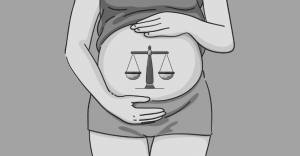
Episode 02: Family Responsibilities
In this episode we discussed the theme “Family Responsibilities” with our guest Regina Stela Vieira, Professor at the Law School of the Federal University of Pernambuco and at the Graduate Program in Law at the University of West Santa Catarina.
In society, the historical construction around gender roles is clear: domestic tasks have always been “naturally” assigned to women, while men occupy the labor market as “home providers”. Until today, these tasks are not seen as real work, as if washing, ironing, cooking and taking care of children did not generate physical and mental exhaustion, and did not take up an inordinate amount of time in women’s daily lives.
Click in the image bellow to check out the full episode (the recording is available in the report).

Episode 03: Obstetric Violence
This week we discussed the topic “Obstetric Violence” with guest Mônica de Melo, feminist, Public Defender of the State of São Paulo, Law Professor at PUC-SP and Member of the Research Group “Law, Gender Discrimination and Equality” at PUC-SP.
Last week, the media exposed a barbaric case of rape against a pregnant woman during labor. In the face of such atrocity, the issue of obstetric violence came to the fore: after all, what does such violence consist of? What are the rights of pregnant women before, during and after childbirth? These and other issues were discussed.
Click in the image bellow to check out the full episode (the recording is available in the report).

Episode 04: Indigenous Feminism
In this episode we received Priscilla Cardoso Rodrigues, feminist, activist and Professor of indigenous rights at the Federal University of Roraima (UFRR) to discuss the topic “Indigenous Feminism”.
According to the latest IBGE survey, Brazil has approximately 900 thousand indigenous people, with about 50% of this population being women. After all, how do these women organize themselves in the fight for their rights? Is it possible to speak of an indigenous feminism? And when it comes to domestic violence, is the Maria da Penha Law adequate and effective in protecting indigenous women?
Click in the image bellow to check out the full episode (the recording is available in the report).
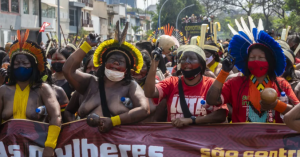
Episode 05: Joint Custody
To discuss this week’s topic, we welcomed Fabiane Simioni, professor of Law and International Relations at the Federal University of Rio Grande (FURG), in Rio Grande do Sul, and co-leader of the INDERI Research Group (Interseccionalities and Decoloniality in International Relations).
The Brazilian Civil Code foresees that, in cases where there is no agreement between mother and father about child custody, it can be done jointly through the so-called joint custody. In this model, both the father and the mother take joint responsibility for all issues related to the rights of their children.
A few years ago, the Brazilian justice system underwent a significant change that established shared custody as the rule in cases where the judge has to decide. But after all, how does this model serve the children’s interests? Is it advisable even when the marital dissolution occurs as a result of domestic violence?
Click in the image bellow to check out the full episode (the recording is available in the report).

Episode 06: Home Detention
To discuss the topic “Home Detention”, we received the feminist criminal lawyer Carolina Costa Ferreira, PhD, Master in Law, State and Constitution from the University of Brasilia (UNB) and coordinator of the Brazilian Institute of Criminal Sciences.
According to data from the National Council of Justice (CNJ), approximately 49 thousand women are currently deprived of their freedom in Brazil. Recently, changes in the law and understandings of the Federal Supreme Court (STF) have allowed these women, in some cases, to serve their sentences in home detention.
But what is home detention? How is it regulated in Brazil? Can it be considered a “benefit” granted by the courts? How does this relate to the protection of early childhood in cases of imprisonment of pregnant women and mothers with children up to 12 years old?
Click in the image bellow to check out the full episode (the recording is available in the report).
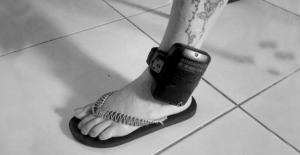
Episode 07: Representation of women, black and indigenous people in political positions in Brazil
In this episode of Women and Justice, Professor Fabiana Severi talks to Salete Maria da Silva, professor at the Federal University of Bahia and coordinator of the Juscemina Research Group, about the representation of women, black people, and indigenous people in political positions in Brazil.
Women won the right to vote in 1932. After 90 years, they represent 53% of the Brazilian electorate, but, according to the United Nations Development Program’s 2020 report, they are a minority among the members of the National Congress, only 15%. Among the indigenous people, a population of about 900 thousand, the representation according to data from the Superior Electoral Court (TSE) is only 0.2%.
Click in the image bellow to check out the full episode (the recording is available in the report).
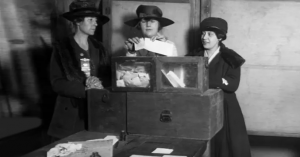
Episode 08: Political Gender Violence
This week we discussed the topic “Political gender violence” with Élida Lauris, human rights researcher, doctor in post-colonialisms and global citizenship and researcher at the Permanent Observatory of Portuguese Justice, both at the University of Coimbra.
The study “Political Violence of Gender and Race in Brazil”, coordinated by Élida and published in 2021, shows that black women without a degree face greater difficulty in getting elected than men and white women in the same condition.
In addition, the researcher states that women are victims of a very specific type of political violence, a daily violence. Insofar as “(…) the man is murdered in order to be excluded from political life, the woman is humiliated, with the aim of achieving her honor.”
Click in the image bellow to check out the full episode (the recording is available in the report).

Episode 09: Women and political representation
In this week’s episode we welcome Luciana Ramos, PhD in State Law from USP, professor at the Getúlio Vargas Foundation Law School and researcher at the Center for Gender and Racial Justice Law (FGV).
From a global point of view, Brazil is among the worst placed in relation to the representation of women in legislative houses (in numerical terms): female political representation varies around 15%, despite women being the majority of the electorate. Moreover, data from the technical note “Cities, race, and elections”, published in 2021 and coordinated by Luciana, show that despite black women constituting 25.4% of the population, in the municipal elections of 2020 only 17% of the candidacies were of black women, and only 6% were elected.
In this sense, what measures has Brazil been adopting to reduce these inequalities? Did the funding quotas benefit white and black women to the same extent?
Click in the image bellow to check out the full episode (the recording is available in the report).

Episode 10: Literature and gender
In this episode we invited professor and writer Ana Lia Almeida to discuss the challenges and contradictions of motherhood, a theme that permeates her new book “Travessia”.
It’s not new that motherhood is one of the main challenges in a woman’s life and, despite that, little is said about the real complexity of this topic. An idealized stereotype of maternity prevails in common sense, in which the contradictions and fears of this experience are left aside.
In her opus, Ana Lia brings her experiences in an implicit way and opens the dialogue about issues such as obstetric violence and autonomy over one’s own body, and allows other women to identify and recognize themselves in a real experience of maternity.
Click in the image bellow to check out the full episode (the recording is available in the report).
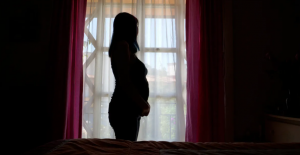
Episode 11: Political Gender Violence
In this week’s episode of Women and Justice, Professor Fabiana Severi talks to Ladyane Souza, lawyer, consultant and researcher. With a Master’s Degree in Human Rights from the University of Brasilia, with the theme Violence and Gender Politics, Ladyane is currently a researcher at the Colombian NGO Dejusticia and shares in this episode her expectations on the application of the brazilian law against political gender violence.
In the 2020 elections, three out of ten female candidates were discriminated against for being women. The data is from the research Gender Equity in Politics, developed by DataSenado in partnership with the Women’s Observatory Against Violence. In an attempt to change this reality, in August 2021 Law n° 14,192 was sanctioned to combat political violence against women.
Click in the image bellow to check out the full episode (the recording is available in the report).

Episode 12: Feminist Constitutionalism
In this week’s episode of Women and Justice, Professor Fabiana Severi talks to Christine Peter da Silva, PhD in Law, State and Constitution from the University of Brasilia and former advisor to the president of the Supreme Court. She is currently a researcher and associate professor in the master’s and doctoral programs in International Relations Law at the Centro Universitário de Brasília.
In this episode, Christine addresses the topic of Feminist Constitutionalism, or Feminist Constitutional State, a term that brings light to all the struggle of women throughout history to win their rights, as well as highlighting the importance of female participation in a democracy.
Click in the image bellow to check out the full episode (the recording is available in the report).

Episode 13: Election results
In this episode of Women and Justice, Professor Fabiana Severi talks to Regina Stela Vieira, professor at the Federal University of Pernambuco Law School and the Graduate Law Program of the University of Western Santa Catarina, about the representation of race and gender in the National Congress after the elections of October 2.
The results of the first round of this year’s elections showed an increase in the number of women elected to the House of Representatives, which went from 15% to 17.7%, with two transgender women elected. In addition, there was a record number of deputies of both genders who declared themselves as brown or black.
Click in the image bellow to check out the full episode (the recording is available in the report).
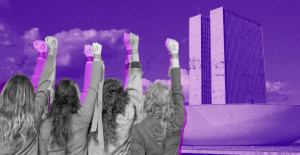
Episode 14: Fake News about the INSS Life Proof
In this week’s episode, concerned about the fake news circulating in the social networks about the relationship between voting and the proof of life required by the INSS, professor Fabiana Severi talks to lawyer and professor Júlia Lenzi Silva, PhD in Labor and Social Security Law and researcher for the Study Group on Human Rights, Centrality of Work, and Marxism, both at the Law School at USP, where she is a professor. The professor explains what it is, how to do the proof of life and how to prove it.
Click in the image bellow to check out the full episode (the recording is available in the report).

Episode 15: Condition of Venezuelan Migrant Women
In this episode of Women and Justice, Fabiana Severi talks to Vanessa Berner, professor at the Federal University of Rio de Janeiro, about the employment of refugees in Brazil.
In the last decade, due to the political, economic and social crisis in Venezuela, many migrants and refugees have been moving to the Brazilian territory, and among them there is a high number of women, Venezuelans who migrate with their sons and daughters. Currently, the great challenge faced by these women is to guarantee their employability, due to the reality of being solo mothers. Data from the interiorization strategy program reveal that, among the women who interiorize when they arrive in Brazil, only 30% were displaced with a guaranteed job.
Click in the image bellow to check out the full episode (the recording is available in the report).
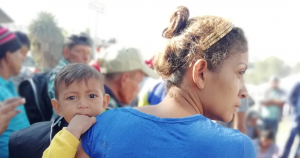
Episode 16: Workplace Harassment
In this episode of Women and Justice, Professor Fabiana Severi talks to Camila de Magalhães Gomes, assistant professor of Criminal Law and Criminology at the Federal University of Rio de Janeiro (UFRJ).
According to the Superior Labor Court (TST), in Brazil, sexual harassment is a crime defined in Article 216A of the Criminal Code and the penalty is detention for one to two years. Although criminal proceedings arising from sexual harassment fall under the jurisdiction of the common justice system, the practice also has repercussions on labor law, according to the TST. In 2019, for example, there were 4.786 lawsuits for sexual harassment in the labor courts.
Camila says that sexual harassment only exists in the context of employment relations, position or function, so it is always a broad sense, a crime that happens within employment relations. “There are conducts, without this element, that could be understood as other sexual crimes, but not sexual harassment.”
Click in the image bellow to check out the full episode (the recording is available in the report).

Episode 17: Public policies to confront domestic violence
Domestic violence against women and girls is a gender-based violence and is also considered a highly complex social problem. It manifests itself in different ways, with different frequencies and intensities, besides being a structural violence, still very naturalized and tolerated by the Brazilian society. These are the conclusions of sociologist Wânia Pasinato, this week’s guest of Professor Fabiana Severi in the series Women and Justice.
Wânia has worked as Access to Justice coordinator at the United Nations Office in Brasília, and as Technical Advisor of the USP Women’s Office. She is currently a collaborator of the Study Group on Human Rights, Politics, Memory, and Democracy of the Institute for Advanced Studies at USP.
Click in the image bellow to check out the full episode (the recording is available in the report).

Episode 18: Fighting gender violence in university environments
In Brazil, according to data published by the Avon Institute, in partnership with the Research Institute Data Popular, about 67% of women who attend college have suffered some kind of aggression, be it physical, moral, sexual or psychological. They are students, professors and employees.
According to Deise Camargo Maicon, lawyer, master and PhD from USP and also researcher at the Center for Teaching and Research in Innovation at the Getúlio Vargas Foundation, guest on this episode of the series Women and Justice, the topic has gained greater visibility in recent years. Gender-based violence in the university environment is when women and LGBTQIA+ people suffer for being who they are, that is, they suffer contempt for being a woman or LGBTQIA+. “Even the issue of sexual violence, most of whose victims are women, is also understood as gender-based violence.”
Click in the image bellow to check out the full episode (the recording is available in the report).

Episode 19: Good legal practices in fighting domestic violence
The Maria da Penha Law is recognized worldwide as one of the most innovative laws in fighting domestic violence against women and girls. This innovation stems from a model of service in the state response, which is quite complex and requires an effort of innovation by all public agents involved in the implementation of the law. It is in this sense that the concept of good practices of the Maria da Penha Law and the idea of a gender perspective in decision-making emerges.
This is the topic of the chat between professor Fabiana Severi and attorney Ana Carolina de Sá Juzo, master’s degree from the Law School of Ribeirão Preto and collaborating professor at the Law School of Franca, in this episode of the series Women and Justice.
Click in the image bellow to check out the full episode (the recording is available in the report).

